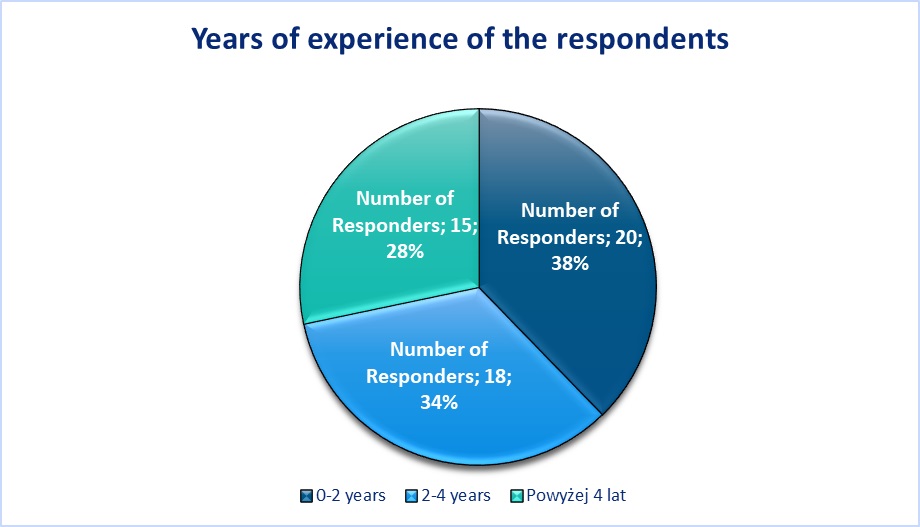In today's ever-changing world, where variability is the only constant, the role of the Scrum Master becomes crucial. However, it is not without its challenges. Have you ever wondered what difficulties Scrum Masters face on a daily basis? Or perhaps you are one of them and are seeking ways to overcome these obstacles? In our report on Scrum Master Challenges, we delve deeper into these issues, offering both insights into the most common difficulties and practical tips to help overcome them. I invite you to read and discover how you can improve your approach to Scrum and everyday teamwork.
Purpose, scope and method of the Study
Purpose of the Study
After observing online posts and consulting with Scrum Master colleagues, we reached the conclusion that a significant aspect of a Scrum Master's role involves the ability to debate, persuade, and demonstrate the benefits of Scrum. We were curious about which areas present the greatest difficulty, what challenges are most common, and what constitutes the biggest hurdle.
The objective of our study was to seek answers to these questions, and particularly to validate the following research hypotheses:
- In their daily responsibilities, Scrum Masters are required to advocate for and persuade their teams regarding the advantages of Scrum and its components.
- Scrum Masters possess the capability and proficiency to advocate for and persuade their teams regarding the benefits of Scrum and its elements.
Moreover, the study aimed to gather insights into the potentially diverse but genuine challenges faced by Scrum Masters working in different locations across Poland.
Respondents
The survey was aimed at people with experience as a Scrum Master or Agile Coach working in Poland.
As a result, 53 people took part in the study, 46 of whom formally fulfilled this role. The remaining 7 people played various roles in the organization, formally or informally supporting the Scrum process, as shown in the table below:
| Name of the position held | Number of people |
| Agile Coach | 2 |
| Formally – data analyst, informally full-time Scrum Master | 1 |
| HRBP/SM | 1 |
| IT project coordinator | 1 |
| Scrum Master | 40 |
| Scrum Master/Agile Coach | 2 |
| Scrum Master/Agile Lead | 1 |
| System Tester | 1 |
| Team leader | 1 |
| Senior implementation consultant | 1 |
| Scrum master, change management practitioner | 1 |
| Expert | 1 |
The surveyed people also had different lengths of professional experience, as shown in the table below:

Research Method
The study was conducted from 02/10 to 02/11.2020, using a survey in Google Forms.
The survey was anonymous.
The study involved obtaining answers on a linear scale (from 0 to 10) to the following two questions:
- In your daily work, to what extent do you need to argue and convince the team about the advantages of Scrum and its elements?
- How do you rate your ability/proficiency in arguing and convincing the team about the advantages of Scrum and its elements?
Additionally, the survey included two open questions:
- What are your biggest challenges when arguing and convincing the team about the advantages of Scrum?
- Apart from that, what are your biggest challenges while working in Scrum?
and a place for questions and comments.

General Conclusions from the Study
During the study, two hypotheses were confirmed:
- Scrum Masters need to advocate for in their daily work and convince the team about the advantages of Scrum and its elements. 77% of respondents to the question "In your daily work, to what extent do you need to argue and convince the team about the advantages of Scrum and its elements?" gave an answer above 5 (on a scale of 0-10).
- Scrum Masters have the ability to argue and convince the team about the advantages of Scrum and its elements. 81% of respondents to the question "How do you rate your ability/proficiency in arguing and convincing the team about the advantages of Scrum and its elements?" gave an answer above 5 (on a scale of 0-10).
Detailed conclusions of the study - "Challenges in the work of a Scrum Master"
Correlation of answers with work experience
With increasing experience in the role of a Scrum Master, the need to argue and convince the team about the advantages of Scrum and its elements decreases. Specifically:
- In the group of people with up to two years of experience, 60% of people claim to have such a need,
- In the group of people with over four years of experience, 47% people claim to have such a need.
The details are presented in the table below:
| Number of respondents to a given answer on a scale of 0-10 (where 0 = Extremely rarely and 10 = Extremely often) | Total number of people in a category | Average grade '5' and below 5 | Average rating above 5 | |||||||||||
| Years of experience in the role | 0 | 1 | 2 | 3 | 4 | 5 | 6 | 7 | 8 | 9 | 10 | |||
| 0-2 years | 0 | 0 | 2 | 0 | 3 | 3 | 3 | 6 | 1 | 1 | 1 | 20 | 40% | 60% |
| 2-4 years | 0 | 0 | 1 | 0 | 5 | 1 | 2 | 3 | 4 | 1 | 1 | 18 | 39% | 61% |
| Over 4 years old | 0 | 0 | 2 | 1 | 3 | 2 | 1 | 2 | 3 | 1 | 0 | 15 | 53% | 47% |
| The sum of responses of a given type | 0 | 0 | 5 | 1 | 11 | 6 | 6 | 11 | 8 | 3 | 2 | 53 | 23% | 77% |
As the survey results show, with increasing experience as a Scrum Master, the ability and proficiency in persuading and convincing the team about the advantages of Scrum and its elements also increases:
- In the group of people with up to two years of experience, 65% claim to possess this skill.
- In the group of people with experience exceeding four years, 81% already exhibit this capability.
The details are presented in the table below:
| Number of respondents to a given answer on a scale of 0-10 (where 0 = Extremely rarely and 10 = Extremely often) | Total number of people in a category | Average grade '5' and below 5 | Average rating above 5 | |||||||||||
| Years of experience in the role | 0 | 1 | 2 | 3 | 4 | 5 | 6 | 7 | 8 | 9 | 10 | |||
| 0-2 years | 0 | 0 | 1 | 2 | 0 | 4 | 4 | 5 | 4 | 0 | 0 | 20 | 35% | 65% |
| 2-4 years | 0 | 0 | 0 | 1 | 1 | 0 | 3 | 5 | 6 | 1 | 1 | 18 | 11% | 89% |
| Over 4 years old | 0 | 0 | 0 | 0 | 0 | 1 | 4 | 5 | 3 | 2 | 0 | 15 | 7% | 93% |
| The sum of responses of a given type | 0 | 0 | 1 | 3 | 1 | 5 | 11 | 15 | 13 | 3 | 1 | 53 | 19% | 81% |
Correlation of Responses with role
When it comes to roles and job positions, 40 out of 53 respondents declared that they held the position of "Scrum Master".
Within this group, half (52%) indicated that they need to argue and convince the team about the advantages of Scrum and its elements.
| Number of respondents to a given answer on a scale of 0-10 (where 0 = Extremely rarely and 10 = Extremely often) | Total number of people in a category | Average grade '5' and below 5 | Average rating above 5 | |||||||||||
| Role/position name | 0 | 1 | 2 | 3 | 4 | 5 | 6 | 7 | 8 | 9 | 10 | |||
| Agile Coach | 1 | 1 | 2 | |||||||||||
| Formally – data analyst, informally full-time Scrum Master | 1 | 1 | ||||||||||||
| HRBP/SM | 1 | 1 | ||||||||||||
| IT project coordinator | 1 | 1 | ||||||||||||
| Scrum Master | 4 | 1 | 8 | 6 | 4 | 6 | 7 | 2 | 2 | 40 | 48% | 52% | ||
| Scrum Master/Agile Coach | 2 | 2 | ||||||||||||
| Scrum Master/Agile Lead | 1 | 1 | ||||||||||||
| System Tester | 1 | 1 | ||||||||||||
| Team leader | 1 | 1 | ||||||||||||
| Senior implementation consultant | 1 | 1 | ||||||||||||
| Scrum Master, Change Management Practitioner | 1 | 1 | ||||||||||||
| Expert | 1 | 1 | ||||||||||||
| The sum of responses of a given type | 5 | 1 | 11 | 6 | 6 | 11 | 8 | 3 | 2 | 53 | ||||
Among the group of respondents holding the position of "Scrum Master", 87% of people claim to possess the ability to argue and convince the team about the advantages of Scrum, as illustrated in the table below:
| Number of respondents to a given answer on a scale of 0-10 (where 0 = Extremely rarely and 10 = Extremely often) | Total number of people in a category | Average grade '5' and below 5 | Average rating above 5 | |||||||||||
| Role/position name | 0 | 1 | 2 | 3 | 4 | 5 | 6 | 7 | 8 | 9 | 10 | |||
| Agile Coach | 1 | 1 | 2 | |||||||||||
| Formally – data analyst, informally full-time Scrum Master | 1 | 1 | ||||||||||||
| HRBP/SM | 1 | 1 | ||||||||||||
| IT project coordinator | 1 | 1 | ||||||||||||
| Scrum Master | 1 | 1 | 3 | 9 | 13 | 11 | 1 | 1 | 40 | 13% | 87% | |||
| Scrum Master/Agile Coach | 1 | 1 | 2 | |||||||||||
| Scrum Master/Agile Lead | 1 | 1 | ||||||||||||
| System Tester | 1 | 1 | ||||||||||||
| Team leader | 1 | 1 | ||||||||||||
| Senior implementation consultant | 1 | 1 | ||||||||||||
| Scrum Master, Change Management Practitioner | 1 | 1 | ||||||||||||
| Expert | 1 | 1 | ||||||||||||
| The sum of responses of a given type | 1 | 3 | 1 | 5 | 11 | 15 | 13 | 3 | 1 | 53 | ||||
The most common challenges in the work of a Scrum Master
In addition to validating the two hypotheses, the aim of the study was also to collect information about the actual challenges of Scrum Masters working in various locations in Poland.
The study showed that in the area of challenges when arguing, they are quite dispersed:
- 30% of people indicate various problems that are not repeatable, e.g. the desire to encourage experimentation in the team, lack of time to introduce improvements, working with "toxic" people.
- 9% of the respondents stated that they did not face any challenges during argumentation.
- Another 9% of respondents believe that the main challenge is "Impossibilism" - the team's reluctance to change, take up challenges or develop resulting from a lack of faith (due to previous unsuccessful attempts or the existing situation) in the possibility of such a change.
- Another 9% of people say that the problem is the team's bad habits (in the areas of, among others, coding standards and test writing) and the team's failure to take responsibility for their work.
- 11% of respondents believe that the biggest obstacle is the reality of the organization in which they work - whether the organization supports and understands Scrum, what is the support and readiness of managers for transformation and the business to change its habits and established paths of conduct.
- The largest group - 30% - believes that the most significant challenge in the work of a Scrum Master is showing the advantages of Scrum. What they lack most is quick, practical, data-supported examples that will generate buy-in and understanding of the team, convince them of the necessity, need and effectiveness of a given technique or method, but at the same time will not be an attempt to force something.
Summary
In summary, the Scrum Master Challenges Study reveals key areas where Scrum Masters encounter difficulties, highlighting the need for strong communication and persuasion skills. The results indicate that work experience influences the ease of managing these challenges, underscoring the value of continuous development and adaptation in a rapidly changing work environment.
The content of the article comes from the Report "Challenges at work of a Scrum Master" - report authors: Luiza Lipień, Dorota Sternalska (December 31, 2020)






